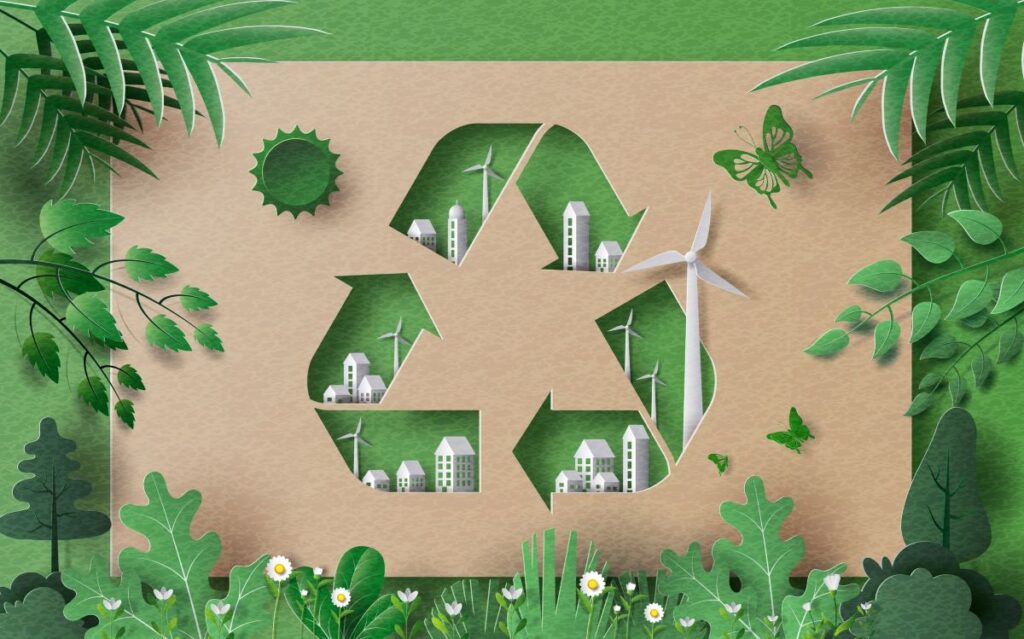The global real estate and construction sectors both play a pivotal role in shaping the built environment with the construction value chains accounting for an estimated 40% of energy and industrial-related CO2 emissions globally.
Without additional mitigation and adaptation efforts, emissions are estimated to increase by about 13% by 2035.

Fig 1 Among the 17 Sustainable Development Goals[3] there are some relevant for the construction industry.
Green Project Management® (GMP) or Sustainable Project Management is the application of methods, tools, and techniques to achieve a stated objective while considering the project outcome’s entire lifecycle to ensure a net positive environmental, social, and economic impact.

Figure 2. Diagram of the “Triple Bottom Line” adapted from John Elkington
Environmental Considerations:
- Site Selection and Design: Optimal site selection and thoughtful design can significantly reduce the environmental footprint of a real estate project. Choosing locations that minimize habitat disruption, maximize natural light, and incorporate green spaces contributes to sustainability.
- Energy Efficiency: Implementing energy-efficient technologies and design principles is crucial. This includes the use of renewable energy sources, high-efficiency HVAC systems, and energy-efficient lighting to minimize energy consumption and greenhouse gas emissions.
- Materials and Resources: Sustainable construction materials and responsible resource management are key components. Using recycled or locally sourced materials, reducing waste, and implementing recycling programs contribute to a project’s overall sustainability.
Social Inclusivity:
- Community Engagement: Sustainable project management involves engaging with local communities to understand their needs and concerns.
- Affordable Housing: Integrating affordable housing options within real estate developments promotes social inclusivity.
Economic Feasibility:
- Life Cycle Cost Analysis: Sustainable project management requires a long-term perspective on economic viability. Life cycle cost analysis helps assess the total cost of ownership, maintenance expenses, and potential savings from energy efficiency measures.
- Return on Investment (ROI): Green buildings often command higher resale and rental values, providing a positive ROI in the long run.

Marula Park Estate by MIXTA Africa. An affordable Housing Project earmarked for EDGE Certification.
Global Collaboration and Standards: Real estate developers can benefit from achieving recognized sustainability certifications such as BREEAM, LEED, EDGE, and Green Star.
These certifications demonstrate a commitment to environmental responsibility and enhance the marketability of projects on a global scale.
Information Technology also plays a key part in achieving green goals.
These tools allow real-time monitoring of energy usage, waste generation, and other sustainability metrics.
Dashboards and reports provide project teams, stakeholders, and investors with transparent insights into the project’s environmental performance.
Capacity Building and Training:
Teams that are educated in sustainability practices are better equipped to integrate them into the design decision-making processes and daily activities.
Access to Green Finance
Real Estate organizations that embrace sustainability have opportunities to access green bonds, sustainable loans, green investment funds, and environmentally responsible banking practices.
Sustainable Development in MIXTA Africa
As part of MIXTA’s strategy to integrate sustainable practices into our developments, Marula Park, a 984-unit residential development project at Lakowe, has been registered for EDGE Certification.
Other upcoming developments are also embracing these strategies.
This will ensure that our customers benefit from reduced energy and water bills, higher resale and rental values, and help reduce our carbon footprint.
In summary, Sustainable Project Management is here to stay.
By embracing environmentally friendly practices, promoting social inclusivity, and ensuring economic feasibility, the real estate and construction sectors can contribute to a greener and more sustainable future.












